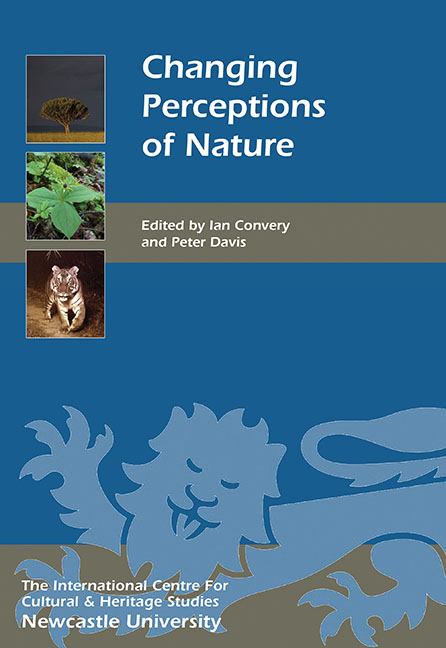Book contents
- Frontmatter
- Contents
- List of Illustrations
- Acknowledgments
- List of Abbreviations
- Foreword
- Introduction
- HISTORICAL PERSPECTIVES ON NATURE
- 1 ‘The Nomination of the Visible’: William Turner's Practice of Natural History
- 2 Early European Perceptions of the Nature of Australia
- 3 Conserving Natural Heritage: Shifting Positions of Culture and Nature
- 4 Three Birds of a Feather – Darwin, Wallace and Attenborough: An Unbroken Tradition of Finding Where the Wild Things Are
- 5 Organising, Naming and Ordering Nature
- 6 Our ‘Great Entail’: Constructing the Cultural Value of the Lake District
- COLLECTING NATURE
- INTERPRETING NATURE AND LANDSCAPES
- CONSERVING NATURE
- PEOPLE–NATURE INTERACTIONS
- List of Contributors
- Index
- Miscellaneous Endmatter
6 - Our ‘Great Entail’: Constructing the Cultural Value of the Lake District
from HISTORICAL PERSPECTIVES ON NATURE
Published online by Cambridge University Press: 26 October 2017
- Frontmatter
- Contents
- List of Illustrations
- Acknowledgments
- List of Abbreviations
- Foreword
- Introduction
- HISTORICAL PERSPECTIVES ON NATURE
- 1 ‘The Nomination of the Visible’: William Turner's Practice of Natural History
- 2 Early European Perceptions of the Nature of Australia
- 3 Conserving Natural Heritage: Shifting Positions of Culture and Nature
- 4 Three Birds of a Feather – Darwin, Wallace and Attenborough: An Unbroken Tradition of Finding Where the Wild Things Are
- 5 Organising, Naming and Ordering Nature
- 6 Our ‘Great Entail’: Constructing the Cultural Value of the Lake District
- COLLECTING NATURE
- INTERPRETING NATURE AND LANDSCAPES
- CONSERVING NATURE
- PEOPLE–NATURE INTERACTIONS
- List of Contributors
- Index
- Miscellaneous Endmatter
Summary
It is widely recognised that shifting perceptions of nature and the attributing of value to specific natural landscapes, such as the English Lake District, are processes that are shaped and influenced by various forms of cultural expression. In order to re-examine the complex interactions between cultural activity and our response to natural spaces, this chapter considers a body of written accounts of the Lakes landscape from a period during which its meanings and value were being radically revaluated, and before the deeply influential Wordsworthian construction of place had been fully established.
The Victorian art and social critic, John Ruskin, would outline a seminal concept of natural heritage in his book, The Seven Lamps of Architecture (1849). He writes that:
God has lent us the earth for our life; it is a great entail. It belongs as much to those who come after us … as to us; and we have no right, by anything that we do or neglect, to involve them in unnecessary penalties, or deprive them of benefits which it was in our power to bequeath.
(Cook and Weddeburn 1903, vol 8, 233)Though a significant milestone in the conceptualisation of nature as heritage, Ruskin's statement is itself shaped by the radical cultural shift in perceptions of nature which had begun to emerge a generation earlier. As Nicholson suggests:
throughout the Middle Ages … we get scarcely a mention of landscape. Indeed the very conception of landscape presumes a detachment, a separation, which people did not then feel … You must be away from it, outside it, to see it at all – no longer a participant but a spectator; no longer a performer, but a looker-on … But with the Industrial Revolution man began to withdraw from the country … It was at this time that the landscape was discovered, for man was so broken away and blocked off from the countryside that he could see it with a new detachment.
(Nicholson 1955, 205–6)This primary moment of rupture between man and the natural world around him generated new perspectives and ideas about nature which we can trace in the art and literature of the late eighteenth and early nineteenth centuries.
- Type
- Chapter
- Information
- Changing Perceptions of Nature , pp. 63 - 72Publisher: Boydell & BrewerPrint publication year: 2016

